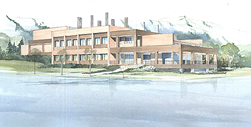This page has been archived and is being provided for reference purposes only. The page is no longer being updated, and therefore, links on the page may be invalid.
|
|
Ground Broken Today for New Poisonous Plant Research LabBy Marcia WoodOctober 18, 2002 WASHINGTON, Oct. 18, 2002--America's only research facility devoted exclusively to investigating pasture and rangeland plants that are poisonous to livestock and wildlife is getting a new home. Groundbreaking ceremonies were held this morning in Logan, Utah, about 90 miles north of Salt Lake City, for the new Poisonous Plant Research Laboratory building, to be operated by the U.S. Department of Agriculture's Agricultural Research Service (ARS). The $7.5-million, 26,700-square-foot building will provide office and laboratory space for scientists, technicians and others who study plants that are poisonous to grazing animals, including cattle, sheep, horses, goats and deer. Plans call for construction to be completed by 2004. The modern, two-story brick building will replace decades-old structures. USDA has conducted research on poisonous plants since 1905. That research led to the establishment of the Poisonous Plant Research Laboratory on the Utah State University campus in 1954. The laboratory is known worldwide for its innovative discoveries about the toxins in plants such as locoweed, lupine and veratrum. The scientists have used these findings as the basis for effective, science-based strategies that livestock and wildlife managers can employ to avert poisonings that could weaken, deform or kill domestic animals and wildlife. " In addition to benefiting our farmers, ranchers and consumers, research results from this laboratory have attracted the attention of biomedical investigators interested in the application of the findings to human health research," said Joseph Jen, USDA's Under Secretary for Research, Education and Economics. The laboratory's discoveries about the toxins in lupine that cause cleft palate in cattle and goats, for example, are of interest to researchers studying cleft palate of humans. Results from the scientists' locoweed tests have garnered the attention of medical professionals who are studying cancer, diabetes and mental retardation. Findings from the laboratory's studies of veratrum are being used in medical research to find ways to prevent birth defects. ARS is the U.S. Department of Agriculture's chief research agency. The ARS Poisonous Plant Research Laboratory scientific staff includes specialists in chemistry, veterinary toxicology, veterinary pathology and rangeland science. |

